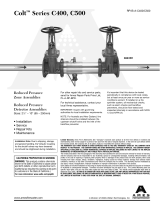
Testing — Double Check Valve Assemblies
200B shown
Bleed Valve A
High
(red)
Bleed Valve B
Low
(blue)
Bypass
(yellow)
RP/IS-A-200B 1322 EDP# 1915369 © 2013 Ames Fire & Waterworks
www.amesfirewater.com
A Watts Water Technologies Company
USA: Backflow- Tel: (916) 928-0123 • Fax: (916) 928-9333
Control Valves- Tel: (713) 943-0688 • Fax: (713) 944-9445
Canada: Tel: (905) 332-4090 • Fax: (905) 332-7068
Limited Warranty: Ames Fire & Waterworks (the “Company”) warrants each product to be free from defects in material and workmanship under normal usage for a period of one year from the date
of original shipment. In the event of such defects within the warranty period, the Company will, at its option, replace or recondition the product without charge.
THE WARRANTY SET FORTH HEREIN IS GIVEN EXPRESSLY AND IS THE ONLY WARRANTY GIVEN BY THE COMPANY WITH RESPECT TO THE PRODUCT. THE COMPANY MAKES NO OTHER
WARRANTIES, EXPRESS OR IMPLIED. THE COMPANY HEREBY SPECIFICALLY DISCLAIMS ALL OTHER WARRANTIES, EXPRESS OR IMPLIED, INCLUDING BUT NOT LIMITED TO THE IMPLIED
WARRANTIES OF MERCHANTABILITY AND FITNESS FOR A PARTICULAR PURPOSE.
The remedy described in the first paragraph of this warranty shall constitute the sole and exclusive remedy for breach of warranty, and the Company shall not be responsible for any incidental, special
or consequential damages, including without limitation, lost profits or the cost of repairing or replacing other property which is damaged if this product does not work properly, other costs resulting
from labor charges, delays, vandalism, negligence, fouling caused by foreign material, damage from adverse water conditions, chemical, or any other circumstances over which the Company has no
control. This warranty shall be invalidated by any abuse, misuse, misapplication, improper installation or improper maintenance or alteration of the product.
Some States do not allow limitations on how long an implied warranty lasts, and some States do not allow the exclusion or limitation of incidental or consequential damages. Therefore the above
limitations may not apply to you. This Limited Warranty gives you specific legal rights, and you may have other rights that vary from State to State. You should consult applicable state laws to
determine your rights. SO FAR AS IS CONSISTENT WITH APPLICABLE STATE LAW, ANY IMPLIED WARRANTIES THAT MAY NOT BE DISCLAIMED, INCLUDING THE IMPLIED WARRANTIES OF
MERCHANTABILITY AND FITNESS FOR A PARTICULAR PURPOSE, ARE LIMITED IN DURATION TO ONE YEAR FROM THE DATE OF ORIGINAL SHIPMENT.
WARNING: This product contains chemicals known to the
State of California to cause cancer and birth defects or
other reproductive harm.
For more information: www.watts.com/prop65
Test Check Valve No. 1
Step 1: Ensure shutoff #1 is open, shutoff #2 is closed.
Step 2: Connect high side hose to test cock #3, low side to test
cock #2 and open both test cock #2 and test cock #3.
Step 3: Open valve C, then open A to bleed air from the high
side. Close valve A, then open B to bleed low side.
Close valve B.
Step 4: Connect vent hose loosely to test cock# 1. Open valve
A to vent air from vent hose, Tighten vent hose at test
cock #1, open test cock #1.
Step 5: Close shutoff #1. Slowly loosen hose at test cock #2
until differential gauge rises to 2 pre-tighten hose. If the
differential reading does not decrease, record check
valves as “tight”.
Test Check Valve No. 2
Step 1: Move the high side hose to test cock #4, low side to test
cock #3 and open both test cock #3 and test
cock #4. Remove vent hose from test cock #1, open
shutoff #1.
Step 2: Open valve C, then open valve A to bleed air from the
high side. Close valve A, then open valve B to bleed low
side. Close valve B.
Step 3: Connect vent hose loosely to test cock #1. Open valve A
to vent air from the vent hose, Tighten vent hose at test
cock #1, open test cock #1.
Step 4: Close shutoff #1, and then slowly loosen hose at test
cock #3 until differential gauge rises to 2psi and retight-
en hose. If the differential reading does not decrease,
record check as tight. Remove all hoses and restore
valve to original working condition.
NOTICE
The assembly will fail both the first and second check valve tests
above, if shutoff #2 leaks excessively. To test for a leaky #2 shutoff,
use the following procedure.
Test for Leaky No. 2 shutoff
Step 1: Connect the high side to test cock #1, low side to test
cock #4. Open test cock #1 and test cock #4. Close
shutoffs #1 and #2.
Step 2: Close valve C. Open valve A, then open valve B 1.2 turn,
loosen hose at test cock #4 to remove air. Retighten
hose.
Step 3: If the differential gauge rises above 0, there is excessive
leakage at shutoff #2 and it must be replaced to test
the assembly.





